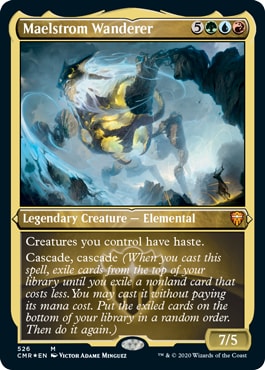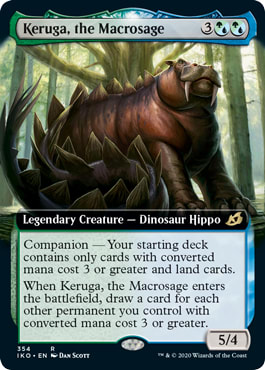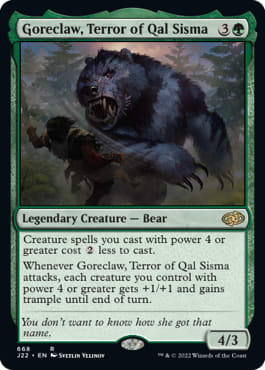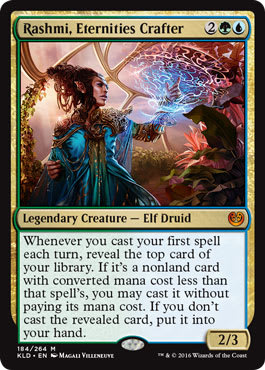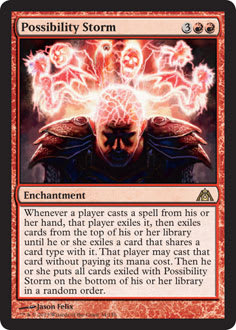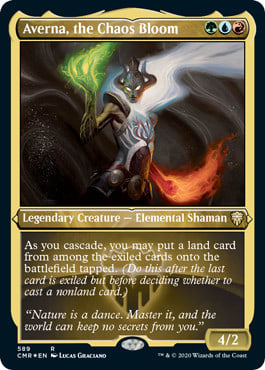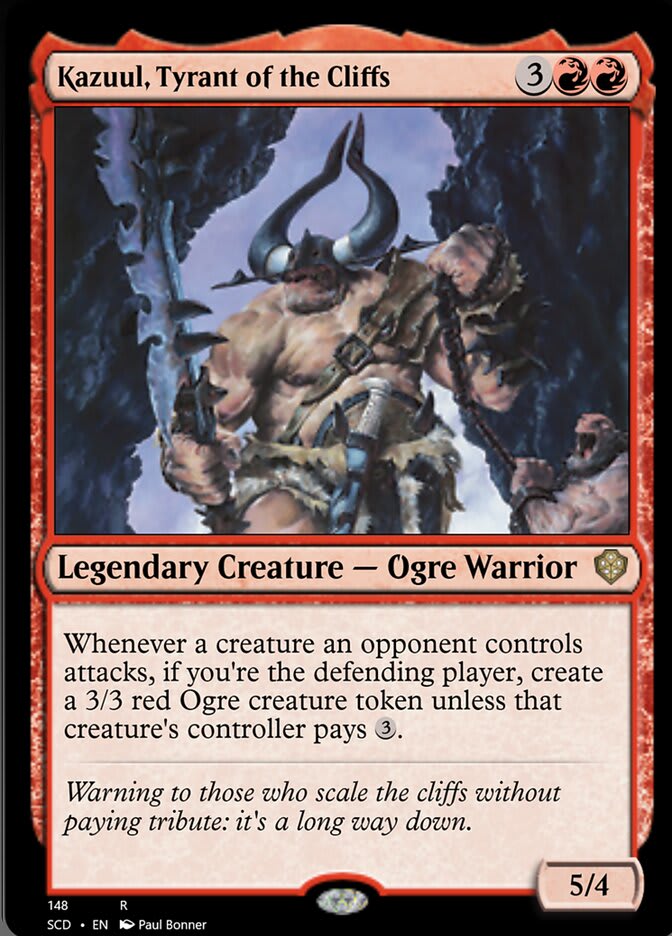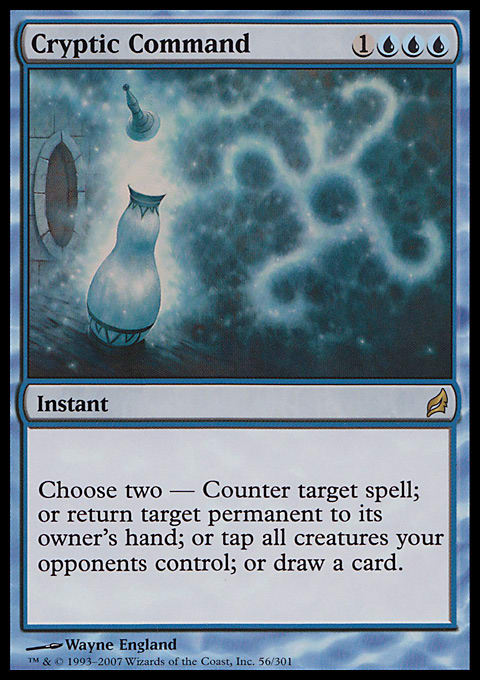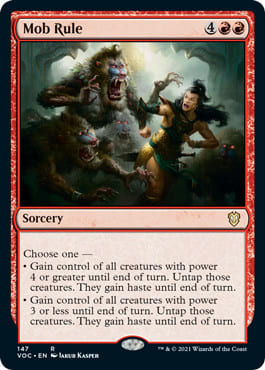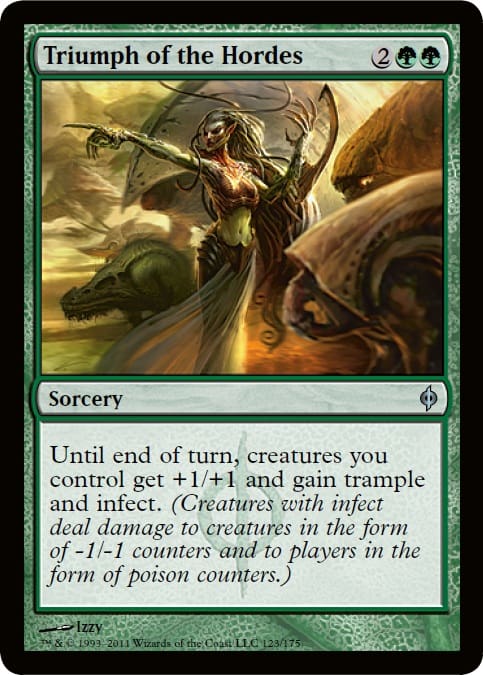
One of the things that has come up a lot in my recent writings has been the idea of trying to win your fair share of games as part of an unspoken agreement in casual EDH that everyone is there to have fun, and that having fun often (not always) aligns with winning games. The thrust of my argument is not that you should "throw" games after winning your first game of the night so that your win rate hovers around 25%. You should generally be playing to win, but in Commander we have an incredible range of power levels at which we can play.
Rather than trying to lose, I like to try to drop to a weaker deck after a win, and upgrade to a stronger deck after a loss. I usually have a range of decks in my bag. Some of them can reliably win games even at higher power levels, and some feel like they are lucky to win games at all. My goal at the end of the day isn't just for me to have fun, but for everyone to have fun over the course of the games we play.
Today's deck is an experiment in trying to make a more casual deck that I can whip out when I want to drop my power level down, but still have a fun and engaging experience. At the right table I might even be able to steal the occasional victory, but any win it might get will be very much thanks to Lady Luck.
Unless you are stacking the top of your deck, there is nothing as fun, or as rooted in luck, as the cascade mechanic. Maelstrom Wanderer will give my creatures haste, can put a tablemate without blockers on a three-turn clock, and will let me cascade twice when I cast him. I love flipping cards off the top of my deck to see what I get, so Maelstrom Wanderer scratches that itch quite nicely. I might flop into just the cards I need to deal with a problem or push for a win, but I also might flop into just the wrong card at just the wrong time.
What is fun and engaging for one person might be the equivalent of nails scraping down a chalkboard to another. This deck captures a lot of what I love about Commander. It is worth remembering that my "fair share" approach really doesn't work in cEDH, where you are genuinely aiming to perfect your deck and your game, and if you are dominating your playgroup, you don't generally power down to give other players an easier chance at winning. You might switch to a high powered game, but you don't "go easy" in cEDH - instead you help your friends improve their decks and their level of play.
Maelstrom Wanderer is not usually thought of as a "casual" commander. Sure, he has a ridiculously high casting cost of 8 mana, but anyone who has played against a highly tuned Maelstrom Wanderer deck knows full well how fast he can get out of hand. This list is not focused on pushing up in power level and seeing how degenerate I can be. I just want to have fun and play a relatively "fair" game. How can I possibly pull that off with a commander like Maelstrom Wanderer?
The Early Game
The first thing most high-powered Maelstrom Wanderer decks want to do is ramp like crazy. You want to power out your commander as quickly as possible because Maelstrom Wanderer brings you value above and beyond just having a 7/5 body with haste.
What you can cascade into depends a lot on what kind of Maelstrom Wanderer deck you are running, but there are great cards that you usually want in the list. Sol Ring, Mana Crypt, Arcane Signet, Chrome Mox, and every other 2 mana Signet, Talisman or playable mana rock you can get your hands on will help to get your commander out early. Dockside Extortionist and a range of mana dorks often make an appearance, and cards like Sensei's Divining Top and Scroll Rack will help you have some control over what you cascade into.
My deck has none of those cards.
I decided to pair my commander with a companion that would prevent me from playing any cards that are under 3 mana. I chose Keruga, the Macrosage as this deck's companion.
I didn't have to include a companion but forcing me to not have much of an early game was a conscious choice. I'll only start ramping on turn three, probably long after other players have begun to build up their boards and even play their commanders. This deck is meant for more casual tables where games are going to go longer. I'll probably never be able to out-race a fast, high-powered deck and if my tablemates have any fear of what my commander can do, they'll probably send some damage my way in the early game.
That means there will be games where I don't really stand a chance. That happens.
There will also be games where the other decks at the table are also playing a longer game and I'll be able to build my board, pay 3 mana to put Keruga into my hand, and cast that big Dino Hippo to draw some cards. It will draw me a card for each other permanent I control with a mana value of 3 or greater and it even has a decent 5/4 body.
There will be plenty of games where I never bother to cast Keruga, but it's nice to have a little extra card draw on hand for games where I need it.
I should be able to start to play Magic on turn three, assuming I haven't missed any land drops. I'm running fewer lands than I should be by choice - I always prefer to be mana-screwed than mana-flooded - but most of my turn three and turn four plays will put lands onto the battlefield. Roughly a fifth of my deck, and a third of my non-land cards are 3-drops, so I should be able to do something as soon as I hit that third land. I'm running a healthy assortment of creatures and spells that tutor up lands, along with cost-reducers, as the main thrust of this deck is to play my commander and see what happens from there.
Forcing myself to have a slow start to the game is a bit like lulling my tablemates into a false sense of security. Casual players often don't put too much energy into attacking a player who is having a slow start. I'll probably always look like that player, but my hope is that once we hit the midgame my deck will begin doing something.
The Mid Game
The midgame of any Commander game has a lot to do with what power level you are playing at, but for this deck I'm thinking of turns 5 through 8 as the time when I want to pivot away from just ramping out lands, dorks and cost-reducers. I often say "when in doubt, ramp," so I'll still push to increase my mana production through the mid-game, but I'm also hoping to play out more fun stuff.
For this deck, fun means flipping cards off the top of my deck and seeing what I get. That means a short list of very special creatures and a lot more cards with cascade.
Rashmi will trigger when I cast my first spell each turn and if it's a nonland card with a lower mana value, I get to cast it for free. Neera, Wild Mage will give me the option of casting a spell, putting it on the bottom of its owner's library, and revealing cards until I reveal a nonland card. I'll cast that revealed card for free and the rest go onto the bottom of the library in a random order. This only triggers once each turn, and it's a may ability, so I can control whether or not I get the spell that I'm casting.
Possibility Storm is not a may ability, and can be a lot of fun and a real headache. It will trigger when any player casts a spell from their hand, so it won't affect cards cast from the command zone or from exile. The cascade mechanic casts cards from exile, so Possibility Storm fits into this deck quite nicely. When a player casts a spell from their hand, they will exile it and then exile cards off the top of their library until they reveal a card that shares a card type with the original spell. They cast that revealed card for free and put the original spell and the other cards exiled with Possibility Storm onto the bottom of the player's library.
This deck runs seven cards that either cascade or care about cascade, above and beyond our commander. Averna, the Chaos Bloom is an enabler which will let me put a land from among the exiled cards onto the battlefield tapped as I cascade. I won't always reveal a land, but if I do I'll be happy to have that land tacked onto my cascade trigger.
I know I've got two cascade triggers in the command zone, but what if I had three or four? Flamekin Herald will turn Maelstrom Wanderer's cascade cascade (best sung to the tune of Tonight Tonight by the Smashing Pumpkins) into cascade cascade cascade (best sung to the tune of Tonight, Tonight, Tonight by Genesis). If a 3 mana do-nothing Elemental Wizard who only matters if I'm able to cast my commander doesn't excite you, let's look at Imoti, Celebrant of Bounty. I wasn't able to dig up any songs for this, but with Imoti and Flamekin Herald on the field you'll get four cascade triggers from Maelstrom Wanderer. Imoti, Celebrant of Bounty also has cascade, and I'll flip into the next 3-drop or 4-drop at the top of my library.
I'm also running Apex Devastator, a 10/10 Chimera Hydra with four cascade triggers, Aurora Phoenix, Etherium-Horn Sorcerer and Bloodbraid Elf, but I left Shardless Agent out of the list because it would never cascade into anything.
Sunbird's Invocation and Mind's Dilation give me a little extra value and are the kinds of enchantments that my tablemates should really get rid of as quickly as possible. The former will have me reveal cards when I cast a spell from my hand and depending on the mana value of the spell I cast and the cards I revealed, I may get extra free spells as a result. The latter triggers whenever an opponent casts his or her first spell each turn. They will exile the top card of their library and if it's a nonland card I may cast it immediately without paying its mana cost.
My midgame is focused on playing out cards that will give me free spells, strengthen my value engine or set me up to draw more cards as I push into the late game. I want to keep my hand as full as I can, and I want to flood the board with creatures.
That's my plan.
Before you tell me it's not a plan, and it's barely a concept, remember what this deck is all about. It's a deck to play when I'm looking for a longer, more casual game or as a follow-up to a game where I was playing a deck that knew exactly what it was trying to do and it succeeded in doing that to win the game.
The Late Game
My late game is all about playing big, impactful creatures and spells that might position me to be able to swing for the win. This is a combat deck, and I've got enough tricks up my sleeve to be able to win the occasional game. If I hit a wincon successfully enough times, I will take the card out in favor of something else just to keep things fresh. This isn't about pushing up my win rate - it's about the experience the deck gives me. I want surprises, and I want a little chaos. I've got a few nasty cards that are really only in the deck because Maelstrom Wanderer could cascade into them and I just happened to open them in boosters. There's no single refined strategy, I'm just hoping for the best.
Kazuul is an old card that doesn't see much play these days, but this 5/4 Ogre Warrior can be a problem for anyone with a wide board who wants to send creatures your way. They'll have to pay 3 mana per attacker or I can create a 3/3. Kazuul is in the list because I have a few photoshopped Red Shrek tokens from years ago and it always makes me happy to have an excuse to put them onto the battlefield. In reality, players just wait until they can remove Kazuul before swinging with their weenies, but he still creates a problem those go-wide decks have to solve before they attack me.
When I want to attack, there's nothing quite as nice as removing all my opponents' blockers. Archetype of Imagination will give my creatures flying and will remove flying from my opponents' creatures. They can still block if they have creatures with reach, but it's a very strong way to set up to finish the game.
Cryptic Command is a modal spell that can counter target spell, return target permanent to its owner's hand, tap all creatures your opponents control or draw a card. These things are not all equal. I'm unlikely to hold up mana to use it as a counterspell, but I am quite likely to use this to bounce my commander to my hand so I can cast him again. I might want to draw a card, but I love the idea of tapping my opponents' creatures and swinging at them with everything I've got to try to close out the game.
This deck is running a few ways to play with my opponents' cards. Etali, Primal Storm will let me cast a card off the top of each player's library when it attacks. I might not hit anything good, but I've seen Etali triggers really swing the balance of a game. Mass Mutiny and Mob Rule are ways to grab creatures from my opponents. The former will give me control of up to one target creature per opponent and the latter will have me choose between either creatures with power four or greater or power 3 or less. Either of these red could position me to knock someone out or even win the game if I steal the right creatures.
I have a few heavy hitters in this deck that are there to really cause problems for my tablemates. As I play this deck, if any of them pop up too often and have too big an impact on how the deck plays, I might swap them out in favor of other spells that do other things. This is meant to be fun, after all, and if my friends start to roll their eyes when I pull out my Maelstrom Wanderer deck, that's a problem.
Moraug, Fury of Akoum can give me additional combat phases if I have lands hit the battlefield during my main phase. I'll want to avoid having that happen in my first main phase, as I'll see the untap and the extra combat phase happen before my regular combat phase. That means creatures tapped and attacking in the Moraug extra combat won't have a way to untap at the start of my regular combat step. Timing this landfall could be tricky as I'm playing a deck with cascade, but that's OK. With a little chaos comes the chance that things won't work out quite right for me.
I'm running three Praetors in todays' list, mostly because they're at a mana value where they could get played off of a Maelstrom Wanderer cascade and because I had them sitting in binders and wanted them to see play. Jin Gitaxias, Progress Tyrant is the biggest headache of the lot, copying my first artifact, instant or sorcery and countering each opponent's first artifact, instant or sorcery each turn. I'm running 11 instants, 7 sorceries and zero artifacts, so this card may not last long in the deck. The other two Praetors are both Urabrasks. Urabrask, the Hidden is the older card and will give my creatures haste and force my opponents' creatures to enter the battlefield tapped. The newer one is Urabrask, Heretic Praetor. It will give me an impulse draw (exile top card and I can play it this turn) in addition to my regular draw and it will replace my opponents' regular draw with that impulse draw.
I'm not in love with having the Praetors in the list, but they are interesting problems for my tablemates to have to deal with and they aren't hooked into any specific gameplan or wincon for my deck. I can swap them out in favor of anything else, give myself a different experience, and the deck won't suffer without them.
Before I close out this section, I should come clean. Yes, this is meant to be a more casual deck. Also, I'm running this card in the list.
Is this deck really a casual deck?
I think you have to remember that everything is relative. There are metas where Triumph of the Hordes is seen as a cEDH level card that shouldn't be played in anything but really high-powered games. At the LGS that I play at, it's not common to see all kinds of powerful cards tossed around in casual games and most folks don't bat an eye. Giving my creatures +2/+2 and infect in the late game is powerful, but if I'm doing it on turn nine or 10, I don't really see a problem with it. I am firmly in the "game's gotta end" camp, provided you aren't closing out games so early that nobody else got the chance to do much of anything in the game.
Is this a card I would swap out if I hit it too often?
Probably, but I also don't mind playing with and against infect. Sometimes you just get killed out of nowhere, or milled out of nowhere, or someone hits a Thassa's Oracle wincon at a power level where you never expect those kinds of shenanigans. I'll keep it in for now, play it if I need to try to close out a game, and do my best to pay attention to the mood of the table. If it starts feeling like any of these cards are winning too many games or being too much of a problem, I'll circle back and look at making changes.
Macrosage Maelstrom Wanderer
If you wanted to tune this deck up, there is a ceiling on Maelstrom Wanderer's power level, but it's pretty high. A tuned Maelstrom Wanderer deck without the added limitation of not running any zero, 1, or 2 drops, can play very well at mid and high-powered tables. Fast mana, a more focused strategy and the ability to play your commander early, bounce him and play him again and again is where you'll probably see the most success if you're tuning this list up.
To tune this list down, you would probably want to drop the more expensive cards and drop the budget down. It's already fairly budget-friendly, but you don't need those Praetors, you could probably drop Consecrated Sphinx, Rhystic Study, and any other generic staples in favor of jankier cards that provide the same thing but less efficiently (or annoyingly). The core concept is that it is fun to flop into cards and if you squeeze enough extra value out of your deck you might just win the game. You can do that on a very low budget and still have fun!
Macrosage Maelstrom | Commander | Stephen Johnson
- Commander (1)
- 1 Maelstrom Wanderer
- Companion (1)
- 1 Keruga, the Macrosage
- Creatures (36)
- 1 Apex Devastator
- 1 Archetype of Endurance
- 1 Archetype of Imagination
- 1 Aurora Phoenix
- 1 Averna, the Chaos Bloom
- 1 Bloodbraid Elf
- 1 Burnished Hart
- 1 Consecrated Sphinx
- 1 Elvish Rejuvenator
- 1 Etali, Primal Storm
- 1 Etherium-Horn Sorcerer
- 1 Fierce Empath
- 1 Flamekin Herald
- 1 Garruk's Packleader
- 1 Goreclaw, Terror of Qal Sisma
- 1 Imoti, Celebrant of Bounty
- 1 Invasive Species
- 1 Jin-Gitaxias, Progress Tyrant
- 1 Kazuul, Tyrant of the Cliffs
- 1 Kraum, Ludevic's Opus
- 1 Lifespring Druid
- 1 Moraug, Fury of Akoum
- 1 Neera, Wild Mage
- 1 Owlbear Shepherd
- 1 Pilgrim's Eye
- 1 Platinum Angel
- 1 Prime Speaker Vannifar
- 1 Quandrix Cultivator
- 1 Rashmi, Eternities Crafter
- 1 Reclamation Sage
- 1 Rift Sower
- 1 Shaman of the Great Hunt
- 1 Solemn Simulacrum
- 1 Urabrask the Hidden
- 1 Urabrask, Heretic Praetor
- 1 Yasova Dragonclaw
- Spells (18)
- 1 Beast Within
- 1 Chaos Warp
- 1 Chord of Calling
- 1 Cryptic Command
- 1 Curious Herd
- 1 Fact or Fiction
- 1 Harrow
- 1 Paradoxical Outcome
- 1 Roiling Regrowth
- 1 Sublime Epiphany
- 1 Whiplash Trap
- 1 Cultivate
- 1 Kodama's Reach
- 1 Mass Mutiny
- 1 Mob Rule
- 1 Sea Gate Restoration
- 1 Solve the Equation
- 1 Triumph of the Hordes
- Enchantments (7)
- 1 Mind's Dilation
- 1 Possibility Storm
- 1 Rhystic Study
- 1 Sight of the Scalelords
- 1 Stolen Strategy
- 1 Sunbird's Invocation
- 1 Zendikar Resurgent
- Lands (38)
- 7 Forest
- 7 Island
- 7 Mountain
- 1 Bonders' Enclave
- 1 Command Tower
- 1 Dreamroot Cascade
- 1 Exotic Orchard
- 1 Forbidden Orchard
- 1 Frontier Bivouac
- 1 Gruul Turf
- 1 Izzet Boilerworks
- 1 Kessig Wolf Run
- 1 Myriad Landscape
- 1 Opal Palace
- 1 Prismatic Vista
- 1 Rockfall Vale
- 1 Rogue's Passage
- 1 Simic Growth Chamber
- 1 Stormcarved Coast
- 1 Thespian's Stage
Early Results
I have had the chance to play a few games with this deck. I've generally picked it when I was trying to start on a lower-powered deck and move up with each game, or pivot to a lower powered deck after a win.
In the three games the deck has seen, each game was slow enough to allow me to play my commander and actually do something before it was all over. Two of the games went past 10 turns and ended with me casting Triumph of the Hordes. One of those wins was a case where I didn't think I had a way to kill the table but a tablemate saw the way the attack could actually kill everyone and pointed it out. I never got a feeling that Triumph was out of place in the power level we were playing at, but it's now definitely on my radar as a card that I need to keep an eye on.
The worst game was a four-player game on Spelltable that turned into a three after a tablemate scooped. Apparently that happens a lot in untrusted webcam games? I don't know, but it did feel a little weird to have my first webcam game see a scoop in response to a slow start and some aggro (not from me). That game was won by a really tuned Sheoldred, the Apocalypse deck and left me feeling like I was a bit under the power level of the table. I wasn't salty and I thanked the guys for the game, but it felt at the time like it was a bit of a mismatch.
At this point I'm not aiming to swap any cards out, and I am looking forward to playing this deck again. It's chaotic, it scratches that itch of enjoying flopping cards off the top of my deck, and it's even managed to win a few games! Remember my goal isn't to throw games, just to have a deck to pivot to that will make for a longer, more interesting game where I'm less focused on hitting a specific wincon.
Hitting Triumph of the Hordes twice in three games was more than a bit lucky, but if I find myself tutoring for certain things and those things turning into wins, I may have to drop out cards like Chord of Calling, Prime Speaker Vannifar and Solve the Equation. I have a bit of a competitive streak, so I find it hard to let up on that throttle when a deck is working and I'm trying to win the game.
I don't want to disrespect my tablemates by assuming their decks can't deal with what I'm doing, but I also don't want to overestimate their power levels and pubstomp. It's a tricky challenge that has everything to do with knowing your meta and being willing to revisit a build and pull out strong cards if the deck is overperforming for where you want it to be.
Final Thoughts
If there is one iconic thing about EDH, it is probably the constant struggle many of us feel in regards to playing the "right" power level, winning our fair share of games, and trying to make sure the experience is fun for everybody, not just ourselves.
I don't think there is a real answer to that challenge.
There will always be salty players who walk away from tables assuming the worst about people they just met or that they barely know. There will always be decks that have a high variance and give you games where you feel hopelessly outmatched and then games where you feel like you should apologize for how badly you beat the table.
Unless you are playing cEDH or you are truly throwing yourselves into the abyss of janky theme decks that play five-hour games and can barely put together a boardstate, much less assemble a wincon, I think we'll always have this struggle. It is a part of the format as much as getting a free mulligan and playing a turn one Sol Ring.
I think what matters is that we're trying to have a fun experience for everyone playing, over a range of games. If that's your genuine goal, you should be OK.
On a side note, it's worth mentioning that this deck is the answer to an age-old challenge - name a deck that wouldn't play Sol Ring. Well, this deck can't even play Sol Ring, so there you go. To some extent I even like the feel of playing that weak early game where all you're doing is playing lands and hoping you draw into more lands or into something you can play on turn three. Adding a Sol Ring (and other fast mana) would mean no Keruga, the Macrosage, and no guarantee that I'll have that weak early game.
I've built other decks that I have used as "pivot" decks that allowed me to pivot to a lower powered deck if I was coming off of a win. My Beast Tribal Goreclaw deck was a fun one, but I don't stay with decks for that long. I'm constantly mixing things up, sleeving up decks I created for columns, and just experimenting with different things. I tend to keep my power levels up a bit, so having weaker decks available is nice.
Whether this list is genuinely weak enough to qualify as a "pivot" deck is something I still need to figure out. It might need to have a few of its teeth pulled before I can really use it as a downgrade.
That's all I've got for today. Thanks for reading and I'll see you next week!
















